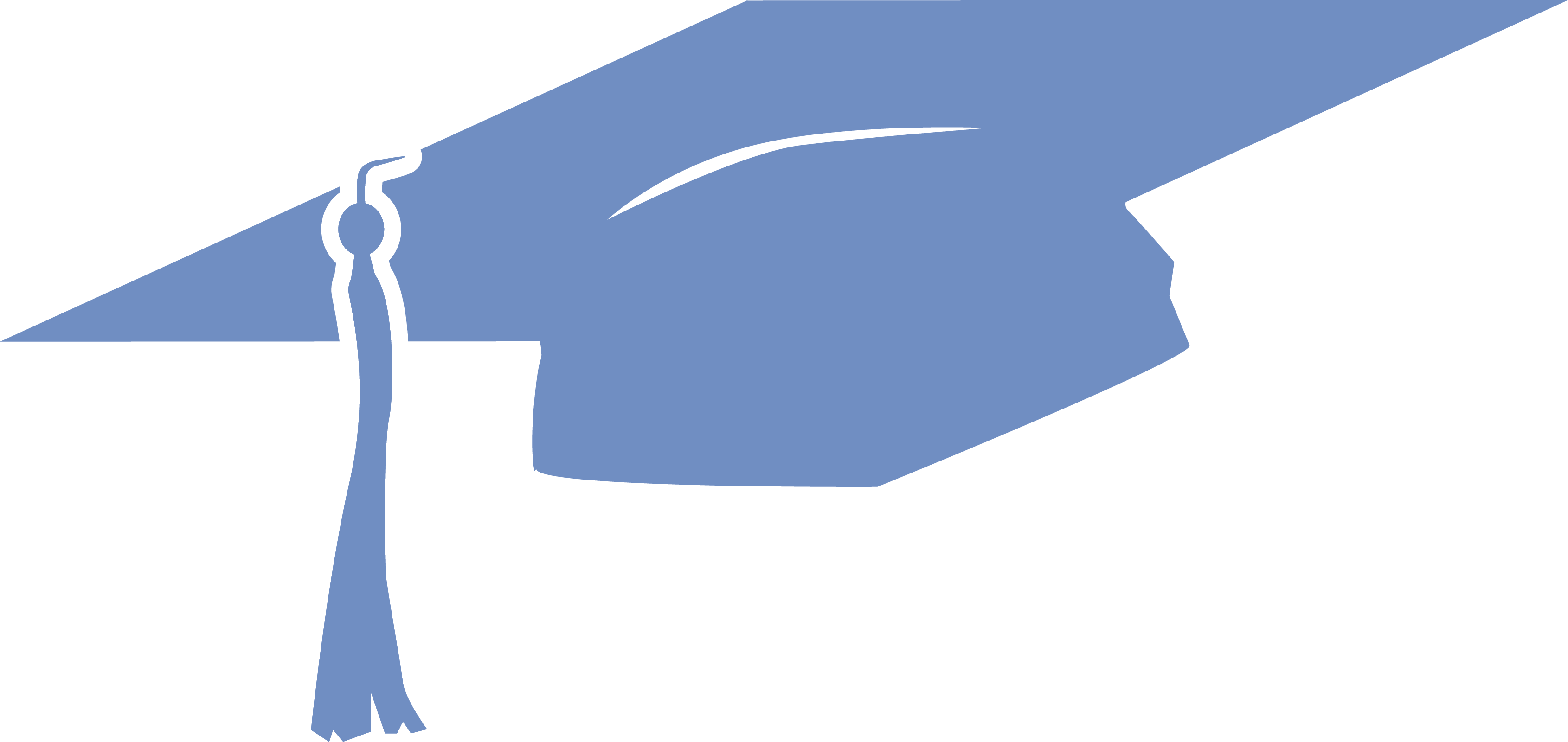The Future of Education in Tennessee
As we seek to recover, rebuild and renew our commitment to education, our students deserve MORE than a return to normal, they deserve to… Believe in Better. Here are our five promises to America’s students and families:
OUR JOURNEY
Nestled between the timeless beauty of The Appalachian Mountains and the majestic Mississippi River, you’ll find The Volunteer State—a land of deep history, culture and activities as varied as its climate. Look closer, past the miles of hiking trails and landscapes dotted with picturesque towns. The most striking feature of our state is not its unparalleled opportunities to explore nature, but the unmatched educational opportunities we could provide our children. Let’s embark on a voyage into the future of education in Tennessee. Together we will travel along the educational path and discover how we can ensure all our students fulfill their potential.
Our journey begins with a look at the efforts made across our state that have brought us to where we are today:
➋ Tennessee’s ACT average has risen steadily as we climb toward the 2020 goal of a statewide average of 21.3
➌ More Tennessee students than ever before are going to college—and fewer students need any form of remediation.4
➍ Tennessee became the first state in the nation to offer every high school graduate two years of community or technical college, tuition-free.5
Still, we are far from our destination of a future in which all children in Tennessee receive an excellent education. Together we must continue charting a path forward and create life-changing opportunities for every student across our state.
2. Tennessee Department of Education. (2018). Tennessee Maintains Progress on 2017 Nation’s Report Card.↩
3. Jason Gonzalez. (2017). “Tennessee ACT scores improve, closing in on 2020 goal.” The Tennessean.↩
4. Tennessee Higher Education Commission. (2018). THEC Reports Show More Student than Ever Going to College, Demonstrate Progress toward the Drive to 55.↩
5. Drive to 55. (2018). Tennessee Promise.↩
Our voices

Shaundraya Hersey
“Providing our students with the tools and access to quality educational and social experiences gives them the power to be positive influences in their environments, while still being their best selves. I believe this philosophy can be used to create and maintain a standard of excellence in schools throughout the state. Students must be able to go to schools that allow them to acquire the knowledge necessary to overcome challenges and accomplish their goals. Knowledge is one of the most powerful tools a person can possess.”
Shaundraya Hersey graduated recently from the University of Memphis School of Law and volunteers with several Memphis education policy and advocacy organizations. She has taught language arts and social studies in Mississippi and Tennessee. She earned her bachelor’s in political science from the University of Southern Mississippi and her master’s in education from William Carey University.

Zahra Chowdhury
“I believe education is a basic human right that everyone should have access to. The quality of the education you receive should not be determined by your zip code, annual home income, race or religious background. I believe that education is a means of upward mobility and serves as hope, encouraging individuals to become what they aspire to be. I believe that one day education inequity will become an issue of the past.”
Zahra Chowdhury is a native Memphian and member of TennesseeCAN’s Change Agent Pilot Program. She is a youth advocate for positive change in her community, working with local organizations like the Midtown Mosque Food Pantry and Memphis Interfaith. She also serves on the BRIDGES Leadership Board, where she facilitates discussions on topics such as education and youth justice.

Patrick Newton
“I’m so pleased Tennessee gives parents the power to choose from several school options to determine which is best for their children. At my charter school we place an emphasis on computer science and preparing students for college. Our approach allows us to stand apart from many traditional public schools. Consequently, we have many parents who choose our school for their children. I enjoy teaching in Tennessee because the educational system emphasizes school choice and the use of data to improve all our public schools.”
Patrick Newton teaches AP US Government at RePublic High School, a public charter school network based in Nashville. He was previously a Teach For America corps member in Lexington, Mississippi. In addition to having taught middle and high school social studies, Patrick coaches cross country and basketball. He graduated with academic honors from Purdue University.

Tim Kelly
“School systems must be transparent and accountable to gain and maintain the public’s trust. Public companies are required to be transparent, and school systems should not be any different. School systems must have the trust and full confidence of their shareholders—the taxpayers—to be able to affect real change and get the resources they need to fulfill their missions. Our futures depend on school systems providing the best possible education to Tennessee’s children. That’s why transparency is so critical.”
Tim Kelly is a Chattanooga-area entrepreneur who grew up in a family automotive business now known as Kelly Subaru, and serves on the Chattanooga 2.0 Steering Committee. Tim also founded Southern Honda Powersports, Zipflip and Socialbot. He serves as chairman and co-founder of the Chattanooga Football Club, ChattanoogaFC.
Our guiding stars

To navigate our journey to the future of education, we must stay pointed in the right direction. Four guiding stars will light the way as we set goals and reach milestones in our travels.
Equity
Not all students enter school on equal footing. Strong education policies must help overcome opportunity gaps to ensure that every school has the resources it needs to empower all of its students. Our policies must provide a high-quality education to every student, regardless of their socioeconomic background, where they live or any other life circumstance.
To reach this destination, we must ensure that all students—including students of color, low-income students, special needs students and students in rural as well as urban districts—are not left behind. We will pursue equitable access to high-quality schools and educators, sufficient funding and school resources, highly-effective classrooms and safe and secure school learning environments for all of the children of Tennessee.
Transparency
Accountability is a key lever for improvements in student achievement, educator effectiveness and school quality. Elected officials, superintendents, school leaders and families need to be able to evaluate how well resources are being used to create high-quality educational experiences for every child. However, this data is often not readily available or accessible.
To reach this destination, we must protect the accountability system and provide for greater transparency of information on student, teacher, school and district performance, as well as taxpayer investments in public education. Academic and financial transparency ensures only the strongest education policies are created and maintained. We must also ensure that any information available is also presented in an easy-to-understand way.
Diversity
Ensuring every Tennessee student has access to a high-quality education is our top priority—and that requires providing students and their families with equitable access to a diverse range of educational options. Whether it’s a traditional public school, a public charter school or a private school, every Tennessee family should have the ability to choose the educational option that best meets their children’s unique needs.
To reach this destination, we will continue to call for policies that provide true choice and access for all students and families—especially those who need them most. We will ensure there are effective, fair enrollment systems and safeguards in place, so families can make the best choices for their children. We will make sure that all of Tennessee’s families are able to navigate the choice system.
Excellence
Guaranteeing excellence in Tennessee’s schools requires setting rigorous academic standards and providing an annual aligned assessment. This will allow us to effectively measure student achievement, to intervene in persistently low-performing schools and to ensure teachers and principals are qualified and effective. Excellence also means we reward our teachers and principals for their achievements and set the bar high for the students in their schools.
To reach this destination, we will continue to support reforms and reinforce existing policies to provide every student with access to a high-quality education. We must also build upon the significant reforms in our current education system—maintaining our national recognition as one of the fastest-improving states in the nation for education.
Our vision
What defines Tennessee is our long tradition of pioneering spirit—one manifest in the icons who called our state home. From the American folk hero Davy Crockett to groundbreaking musicians like Elvis Presley and Dolly Parton, the vibrant pop-artist Red Grooms and football hall-of-famer Reggie White, we see that our kids can succeed in any direction they choose. These remarkable figures embody a rich spectrum of options and opportunities—a diverse range of dreams that we can bring within reach of every child by understanding, celebrating and building toward potential in any field.
There’s no limit to what our children can achieve, inspired by the leaders who came before them, if we reimagine our public education system in the Tennessee tradition.
We believe it is possible for every student in our state to have access to a high-quality school. We know the journey will span multiple years and involve many different stakeholders. As a group actively engaged in charting the educational course for our state, we will lead the charge for initiatives around highlighting quality, bringing sunlight to critical information and data, increasing choice and investing in innovation. We know that with partners, advocates and policymakers working toward shared goals, we can ensure our state’s education policy puts students first.
We are charting the path to a future where:
High-quality and meaningful school choice is within the reach of every family, whether that is a public, private or other school that best fits their child’s needs.
Quality data is at the fingertips of both parents and policymakers to ensure accountability and parent empowerment are present every step of the way.
Schools are funded for the exact needs of students they are serving, and those resources are spent in a transparent way.
State and local education leaders are consistently promoting student achievement and rewarding teacher excellence.
A student’s educational journey
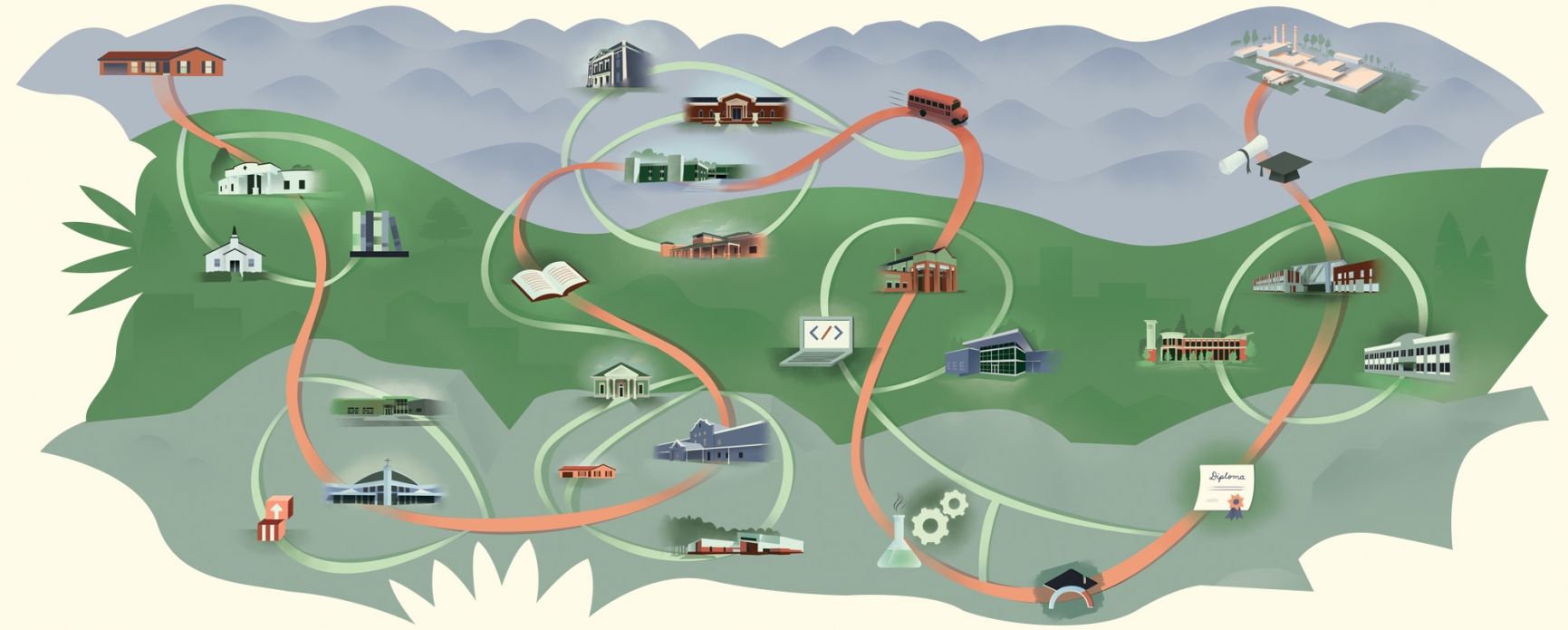
What do we hope it will be like for a family to embark on an educational journey in the Tennessee of the future? Follow along to see the range of choices we hope they will have for their children’s first 18 years.
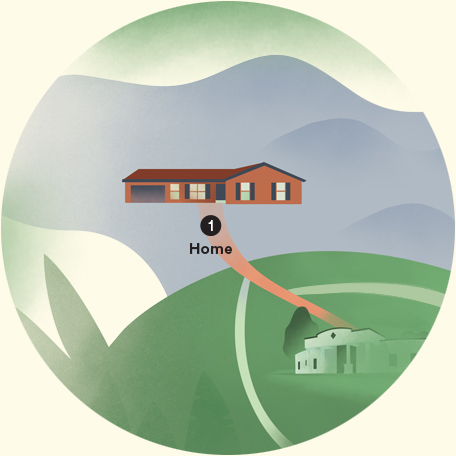
Home
Alex is born into a family of modest means in the city of Memphis.
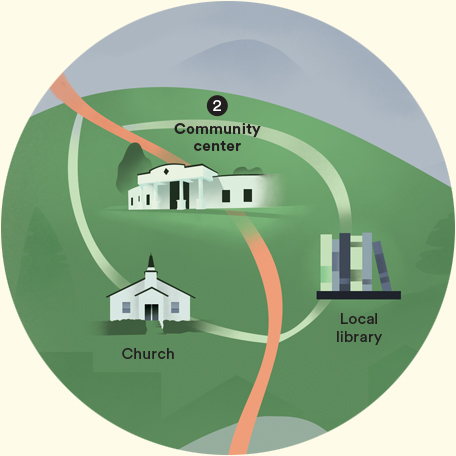
Community center
Alex spends time at her local community center while her parents are at work.
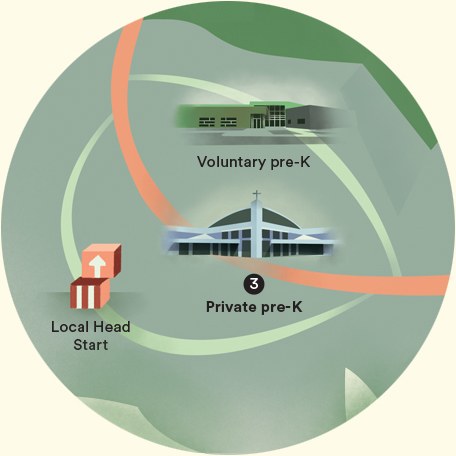
Private pre-K
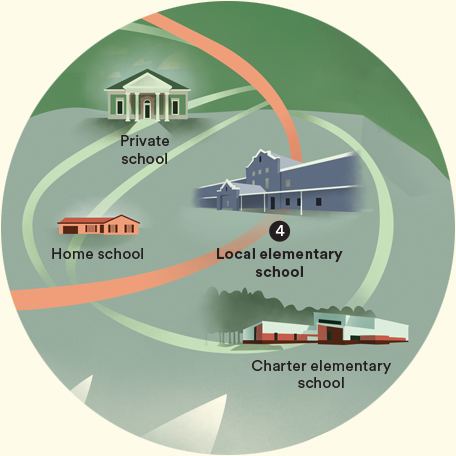
Local elementary school
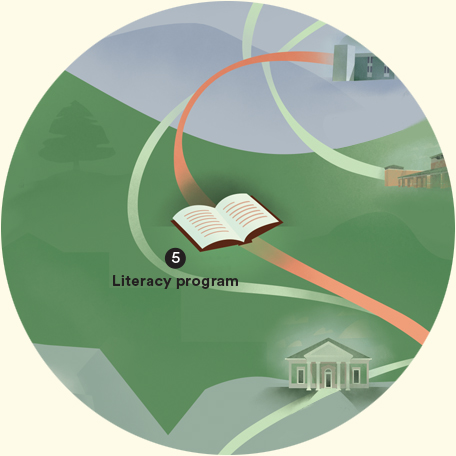
Literacy program
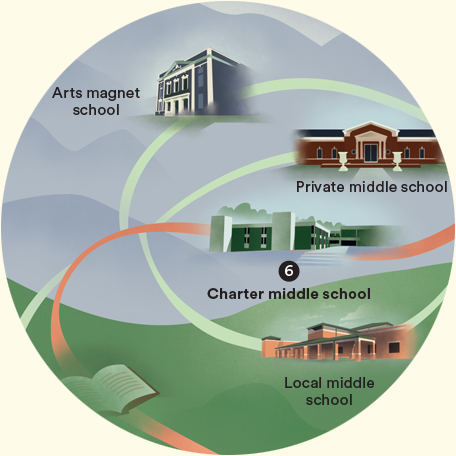
Charter middle school
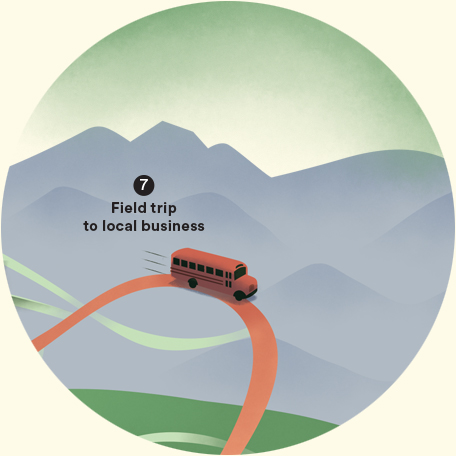
Field trip to local business
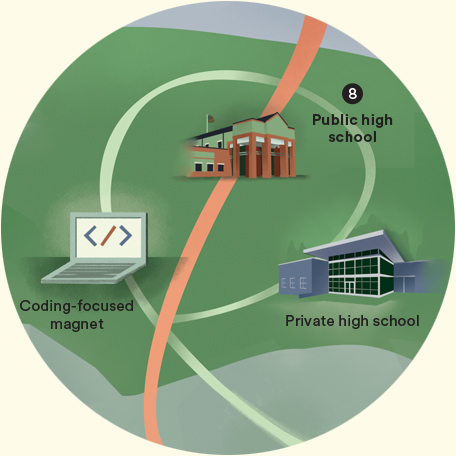
Public high school

Work-based learning
Tennessee Promise
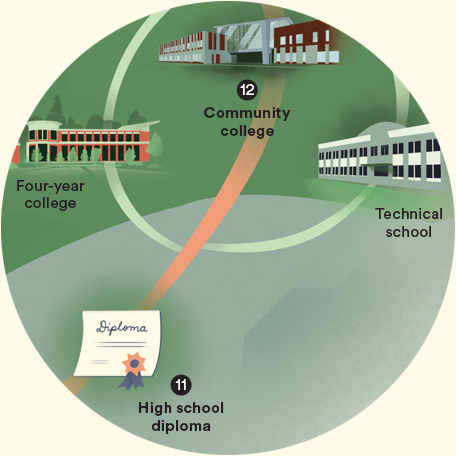
High school diploma
Community college
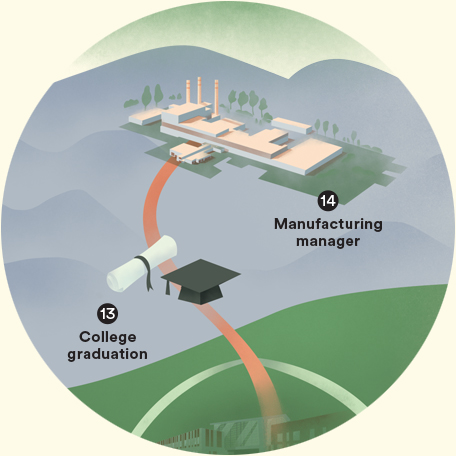
College graduation
Manufacturing Manager
20,736 Options
Alex and her family could have navigated this map 20,736 different ways to customize her education. The map represents only a small fraction of the total choices available to them.
Measures of success
Our hope is that this journey into the future will provide vision and guidance so Tennessee can emerge as the national and global leader in educational opportunity for all. We want the “Tennessee Model” to serve as an example for communities and countries around the world. While our four guiding stars provide us with a uniquely Tennessee vision of change, we also know that we must track our progress against other states. To do so, we will use 50CAN: The 50-State Campaign for Achievement Now’s four dimensions of a healthy and dynamic learning system:
Community → Effective, sustainable policy change requires strong relationships, real-time feedback and long-term ownership by the people served.
Competition → Greater responsiveness and better outcomes are more likely when people have the power to choose among multiple options to meet their needs.
Performance → Success requires both the flexibility to pursue excellence and rigorous standards to ensure those serving the public are held accountable for their results.
Pluralism → Diverse populations are better served by dynamic systems that support lots of paths to success and embrace different traditions, values and beliefs.
Below you’ll see how we currently rate ourselves in each dimension. These ratings use 50CAN’s four-point scale. We also outline next steps for our future progress.
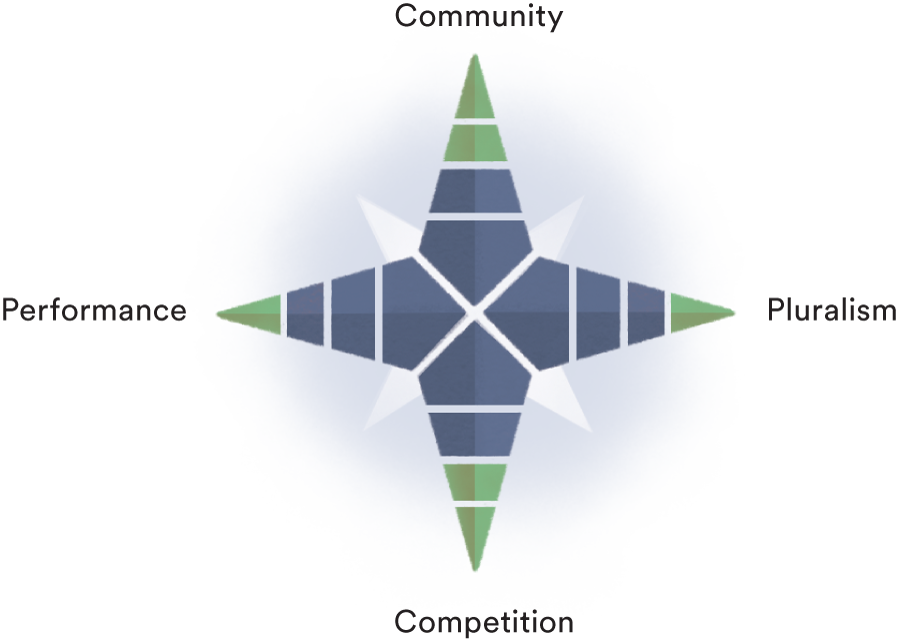
Community
(2 points out of 4)
Our nonprofit, business and community leaders are committed to improving our learning outcomes, and parents actively engage with our schools. Districts and schools should remain firmly committed to outreach and communications to ensure that this engagement is a two-way street.
Competition
(2 point out of 4)
While we have a wide range of educational options that many students are taking advantage of, these schools of choice are not accessible to all students. We should work to ensure all families know their options and can easily enroll their child in the school that best meets their needs.
Performance
(3 point out of 4)
Our new rigorous standards and assessment, robust supports for school leaders and strong accountability systems for schools and teachers make performance one of our strengths. Still, there is room for growth in how our state funds students based on need, and creating a funding model that is more transparent.
Pluralism
(3 points out of 4)
We have made progress in developing an array of educational programs and expanding our definition of post-secondary success. Still, we must expand our definitions of school quality, and better encourage a variety of school types and educational settings to meet the diverse needs of all Tennessee students.
Click here for an in-depth look at these measures of success, and to track our progress along our journey.


